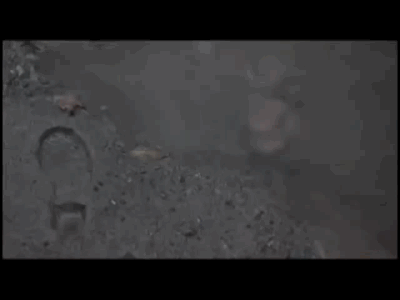A TRYST OF LOVE WITH BARAN
The landscape is barren and its trees are skeletal. It has a muddy road winding through it, upon which a red truck slowly drives. A young burqa clad Afghan girl named Baran (Zahra Bahrami) sits in the back of this truck, her eyes are the only visible parts of her body. Her gaze is directed toward a young man named Lateef (Hossein Abedini). Both characters gaze at each other knowing and acknowledging their love, yet fully conscious of the fact that this is likely the last time they will see each other. As the truck drives away and becomes invisible in the frame, Lateef turns towards an empty line of houses, and stares at the muddy footprint left by his beloved. He smiles as it starts to rain and the footprint disappears. These are the final moments from the film Baran (Majid Majidi, 2001); they are the culmination of a delicate and romantic fable, wherein only glances, gazes and sighs are exchanged between the two lovers. The rain here symbolises the transition of Lateef from a boy to a man, personified by the girl herself, whose name is Baran, which means rain in Persian.
When I was in film school, my professor reiterated the need for visuals to talk. Films should be like visual poetry, weaving a seamless story with minimal need for dialogue. It was not until I chanced upon Baran that my professor's words suddenly became crystal clear. Majid Majidi is a celebrated Iranian director, known for focusing on the mundane particulars of daily life, yet setting them against a wider socio-political canvas. For instance, his films Children of Heaven (1997) and Colours of Paradise (1999) both dealt with childhood innocence, yet the former was meant to highlight struggles of a poor family in Iran and the latter the search for God and meaning of religion in one's life. However, until the release of Muhammad: The Messenger of God in 2015, Majidi's socio-political commentary in his films has been subtle, like a constant background score playing. In Baran, Lateef is a young labourer in Tehran, who mainly serves tea and fetches groceries at a construction site. An Iranian, who illegally employs refugees from Afghanistan for a lower wage, owns the construction site. This sets the backdrop, the surge of refugees from Afghanistan to Iran, and the simmering tension between the locals and refugees. One day, an Afghan labourer named Najaf injures his leg at the construction site, and thus the next day Najaf's friend brings his young son to take his place. However the son is very young and staggers under the strenuous labour. The construction manager then assigns Lateef's job to the young boy and Lateef gets assigned the hard labour.
Initially Lateef riles against this but eventually discovers that the young boy is in fact a girl! In a society where interaction between a man and a woman is minimal, let alone a woman going out to work, this sudden discovery catches Lateef off-guard. We slowly witness the love develop between Lateef and Baran via soulful glances and exchanges. These remind me of a quote often attributed to French renaissance scholar François Rabelais: "gestures, in love, are incomparably more attractive, effective and valuable than words." Throughout the film, Lateef becomes tender in his dealings with Baran, and Baran in return acknowledges it with small gestures. In the chaos surrounding the two lovers, their faces light up with a glow and both fall in love with each other without even exchanging a single word or touch. Majidi's shots are dense and packed with meanings that are mindful of the cultural milieu against which the love story is set. Here Majidi triumphs in building a visual language to express hues of emotions.
Baran's surroundings are stark, and Majidi's wide-angle shots capture the sense of uncertainty that the refugees face. Juxtaposing these wide shots with the intense close-up and emotions of Lateef, Majidi tries to show the human side and turn of events. Baran's entry and exit in Lateef's life are the result of wider socio-political upheavals, yet these upheavals manage to impact Lateef. Lateef transforms from a lanky, lazy, impulsive boy into a man, and what initially appears to be mere infatuation and in some instances comical expression of emotions, Lateef's drive to make Baran's life even slightly bearable as a refugee is a powerful evocation of universality of being. A Majid Majidi film might appear slow and laborious, and perhaps a bit pedantic about his shots, but maybe that is why Lateef is smiling at the end, underscoring Majidi's stature as a powerful visual storyteller.

